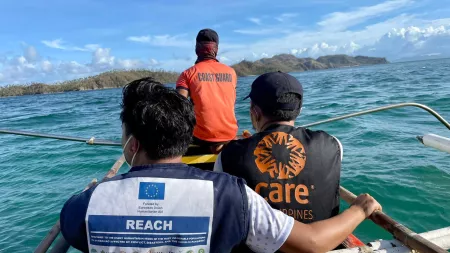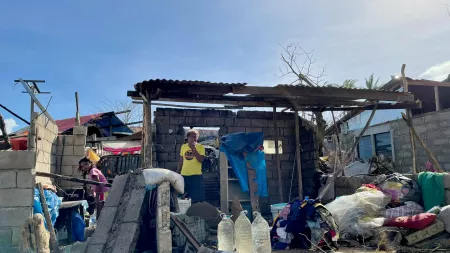Humanitarian organizations called for continued assistance for Typhoon Odette survivors amid a rise in dengue infections in affected areas.
“We hope the newly elected chief executives can continue efforts in helping households and communities affected by Super typhoon Odette as there are still so many things that need to be done almost 6 months since the typhoon devastated the Philippines. Reports showed rising numbers of dengue cases in typhoon-affected areas in Visayas and Mindanao while there are also not enough health workers tending to COVID-19 response and other essential health services,” said Oxfam Pilipinas Country Director Lot Felizco.
According to the United Nations Office for the Coordination of Humanitarian Affairs (OCHA) report, dengue cases rose in Southern Leyte and Caraga. News reports also mentioned an increase in dengue cases in Central Visayas with the Cebu City Health Department quoted as saying it’s possibly due to the widespread flooding caused by Super typhoon Odette and Tropical Storm Agaton.
A Center for Health Development - CARAGA dengue surveillance report shared with Oxfam Pilipinas showed that 867 dengue cases were reported from January 1 to May 14, 2022. This is 287.1% higher compared to the same period last year.
“Local health officials have warned earlier this year that Super typhoon Odette could trigger a rise in dengue infections as flooded areas become breeding grounds of mosquitos. And that’s what we are seeing now. In Caraga, we’re seeing a steep rise in dengue cases in Surigao and Dinagat Islands, which are also among the most affected by Super typhoon Odette”Oxfam Pilipinas Country Director, Lot Felizco
CARE’s Integrated Risk Management Director Celso Dulce said this is why civil society and government should continue supporting the typhoon survivors.
Continued Displacement
“As a Category 5 tropical cyclone, Super typhoon Odette’s destruction really affected a large population — 12 million people in 10 regions in the country. While the death toll is fortunately not as high as Super typhoon Haiyan’s in 2013, it deeply affected the livelihood and living conditions of survivors,” said Dulce.
Oxfam Pilipinas and CARE Philippines are among the groups that have received additional 10 million euros in funding from the European Union Humanitarian Aid (EU Aid) to facilitate life-saving assistance and rehabilitation efforts in Super typhoon Odette-hit areas.

Part of the funding (5.8 million euros or P326 million) will be used to provide food security and livelihoods, water, sanitation and hygiene, shelter, health, education in emergencies, protection assistance, and other services to more than 300,000 individuals in Bohol, Cebu, Dinagat Islands, Southern Leyte, Negros Occidental, and Palawan through a project implemented by CARE, ACCORD Inc., National Rural Women’s Coalition, Plan International, and Action Against Hunger.
Another EU AID-funded project (worth 3.8 million Euros or P214 million) led by Oxfam Pilipinas and jointly implemented by Save the Children and Humanity & Inclusion (HI), together with local partners SIKAT and IDEALS, aim to provide shelter and education support, protection activities and other in-kind assistance to more than 115,000 Typhoon Odette survivors in Bohol, Southern Leyte and Surigao del Norte.
Despite such efforts, CARE Philippines said more assistance is needed in remote areas as survivors have received little or no support due to geographical and humanitarian barriers. This makes it even harder to recover from the multiple impacts of the super typhoon.
Six months since the typhoon devastated parts of the Philippines and almost 7,000 people are still displaced in Regions VI, VII, VIII, MIMAROPA, and Caraga, according to UN OCHA. The majority of them are in evacuation centers and around 650 are staying with relatives or friends in nearby villages. The report also noted that there has been a decline in food and nutrition support for displaced families as response activities are now winding down.
Economic Recovery 6 months on
The non-governmental organizations are also concerned about livelihood recovery for the affected population.
“There is still debris in the agricultural lands due to fallen coconut trees which have not been cleared and are already decomposing 6 months after the typhoon. Plots of land are left unusable, making it hard for families who rely on farming,” said Action Against Hunger Philippines Country Director, Suresh Murugesu. He further added, “in other areas where we work, many fisherfolks whose boats were damaged by the typhoon are still not able to return to fishing as their main source of income.”
Some areas like Siargao Island are already setting their sights on reviving local tourism. “We welcome such efforts and we hope this will spur local economic growth that is very much needed, as many lost their livelihoods due to Typhoon Odette. Besides farmers losing their harvest and crops, many tourism workers were also suddenly left jobless,” said Chito Dugan, Executive Director of Sentro para sa Ikauunlad ng Katutubong Agham at Teknolohiya Inc. (SIKAT Inc.).
Meanwhile in Southern Leyte, Plan International Philippines has encountered some families who have decided to invest their relief funds to restart the local economy. Because the financial aid they received from the government was not enough to cover the costs for repairing their houses, some families in the area have decided to use these funds to restart their small businesses which were wiped out by the typhoon.
Mental Health Toll
There are also other forms of assistance that are needed such as psycho-social and mental health care services. According to UN OCHA, many adolescents and young people are ‘in great distress’ after their experience during Super typhoon Odette and Tropical Storm Agaton, which resulted in landslides last April.
The Oxfam Pilipinas, Save the Children and Humanity & Inclusion project supported by EU AID, provides mental health and psychosocial support training at the community level with HI as technical lead. Some of the psychosocial sessions aim to help teachers who are still recovering from the impact of the typhoon.
Felizco said it’s also important to note that the Philippines will have to brace for more intense typhoons. “As we commemorated World Environment Day last June 5, we hope government would hasten the shift to renewable energy. The continued carbon emissions will only worsen the impacts of climate change, resulting in more catastrophic typhoons,” said Felizco, who explained that warmer ocean temperatures have resulted in more intense typhoons.
Through EU AID funding, the organizations have been able to provide cash assistance, shelter repair materials, training sessions and educational support to the affected communities. The Oxfam Pilipinas-led project also involves provision of teaching supplies and multi-purpose learnings spaces in schools, among other forms of support. However, much still needs to be done to help those who are still displaced and the rest who are still reeling from the physical, economic, emotional and psychological damage wrought by the disaster, the groups said.
About EU Civil Protection and Humanitarian Aid: The European Union and its Member States are the world's leading donor of humanitarian aid. Relief assistance is an expression of European solidarity with people in need all around the world. It aims to save lives, prevent and alleviate human suffering, and safeguard the integrity and human dignity of populations affected by natural disasters and man-made crises. Through its Civil Protection and Humanitarian Aid Operations department, the European Union helps millions of victims of conflict and disasters every year. With headquarters in Brussels and a global network of field offices, the EU provides assistance to the most vulnerable people on the basis of humanitarian needs.
For media requests, please contact CARE Philippines Communications and Knowledge Management Specialist, Rya Ducusin, [email protected], or Oxfam Pilipinas Senior Officer for Media and Digital Influencing Kristine Sabillo Guerrero, [email protected]
